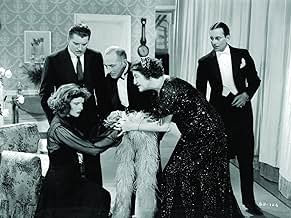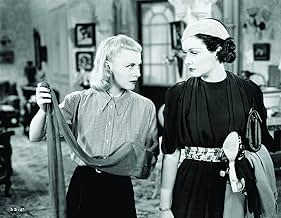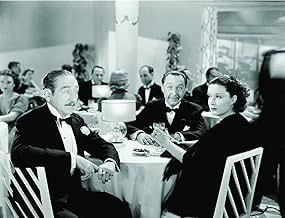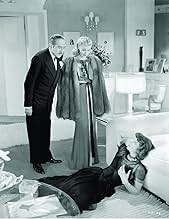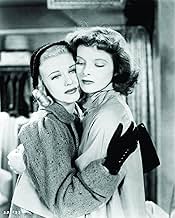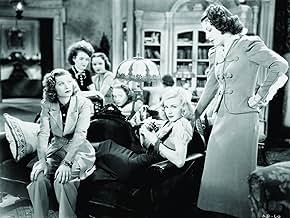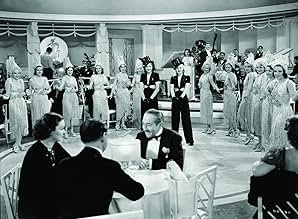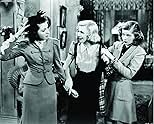VALUTAZIONE IMDb
7,7/10
9428
LA TUA VALUTAZIONE
Aggiungi una trama nella tua linguaA chronicle of the ambitions, dreams, and disappointments of aspiring actresses who all live in the same boarding house.A chronicle of the ambitions, dreams, and disappointments of aspiring actresses who all live in the same boarding house.A chronicle of the ambitions, dreams, and disappointments of aspiring actresses who all live in the same boarding house.
- Regia
- Sceneggiatura
- Star
- Candidato a 4 Oscar
- 5 vittorie e 5 candidature totali
Recensioni in evidenza
Something very sinister happened to movies between 1937 and the 1950s that made this kind of film impossible to make. It's a terrific example of ensemble acting, with no one taking a back seat to anyone else. Ginger Rogers is absolutely amazing, especially after seeing some of the fluffy stuff she did with Astaire. It's hard to believe this is the same actress.
The dialogue zips along with lighting speed including some great laugh-out-loud one-liners. What a wonderful script! Very much like "Grand Hotel" in its structure and shockingly adult themes.
The relationships between all the women are so complex it's hard to believe it was actually made when it was. It makes men look very bad - at best we're imbeciles, at worst, Svengalis. And it has the same kind of uneasiness and disillusionment with the theater that "Sunset Boulevard" had with the movies. I wish there were more like it.
The dialogue zips along with lighting speed including some great laugh-out-loud one-liners. What a wonderful script! Very much like "Grand Hotel" in its structure and shockingly adult themes.
The relationships between all the women are so complex it's hard to believe it was actually made when it was. It makes men look very bad - at best we're imbeciles, at worst, Svengalis. And it has the same kind of uneasiness and disillusionment with the theater that "Sunset Boulevard" had with the movies. I wish there were more like it.
In fact this film version of a stage play by Edna Ferber and George S Kaufman, directed by Gregory La Cava is 70 years old and although it may show a wrinkle here or there - like having Adolph Menjou as the romantic lead - the youthful energy in the acting and dialog has surfed the waves of time unscathed. The bunch of girls populating the Footlights lodgings is a smashing crowd. Katharine Hepburn, brisk and Hepburnish already to the hilt. Ginger Rogers drinks, scratches and dances a duet with Ann Miller. Eve Arden, as usual, delivers the best one liners and Lucille Ball seems ready for a startling career. Andrea Leeds got an Oscar nomination and Constance Collier plays an over the hill actress that becomes Hepburn's minder, just like in real life. The film moves at an incredible speed and I defy you not to tear up when Hepburn makes her entrance with the Calla Lillies in bloom.
8sol-
A very well acted classic drama with great characters that interact realistically when together, it is also supported by some fine acting. Katharine Hepburn is very strong and natural, and Ginger Rogers matches her, playing a witty and almost cynical character very well. Gail Patrick is great too, yet Andrea Leeds was the only cast member to go on to receive an Academy Award nomination, however she is the best of the bunch, giving life to a frail and emotionally unstable aspiring actress. It is a bit overly talkative, and it has at least one too many subplots going on, however the film presents such an interesting insight into the lives of wannabee actresses that these points hardly matter. It is indeed a little difficult to distinguish each of the supporting characters as individuals, and perhaps they could done with further development, but yet this factor is very much like how all the aspiring actresses in the world are: indistinguishable, until you get to know them - and how actresses get ahead in the world is a lot of what this film is about. The final few minutes of the film could have been chopped out; otherwise this is good viewing all the way through.
Framed and shot as though a stage play which it was originally, but much changed for the film and with a stage play within the staged play, le tout ensemble in this witty farce delivers a virtual non-stop, wise-cracking, virtuoso performance. Timing is everything and in comedy, it's particularly so; and the director, Gregory La Cava who cut his teeth, in the silent era, as a director beginning in 1916 doesn't miss a beat with this one.
From a play by Edna Ferber (of Giant fame) and George S. Kaufman, the film tells the story of what happens to a group of aspiring actresses who happen to board at a place called the Floodlights Club in New York City, supposedly. Of course, there are minor players, as in all plays Lucille Ball, Eve Arden, Ann Miller and most of the men, the exception being Adolphe Menjou as a caricature (almost) of the Big Bad Producer of those days. The majors, Katharine Hepburn (as Terry), Ginger Rogers (Jean), Gail Patrick (Linda) and Andrea Leeds (Kay) form the core about which this story revolves.
Which, when all is said and done, is about the ascendancy of Terry as an actress and the decline of Kay as another: out with the old, in with the new, if you will. That would tend to make for a somewhat pedestrian story if it were simply that. Happily, what sets this apart from, say, the almost maudlin characterization by Hepburn in Morning Glory (1933) in a similar situation (for which, however, she did receive a Best Actress award in 1934), is, first, the scintillating dialog. Which means the viewer must really listen: it goes so quickly between characters that you'll miss the one-liners and sight gags if you take a chomp on a sandwich or sip of coffee, or whatever. So, be prepared.
What's left? Well, of course, the great acting by Hepburn, Rogers, Ball, Miller, Menjou, Arden, Patrick and Leeds, the latter getting a Best Supporting nomination for her somewhat overly tearful acting; so much so, she reminded me of Olivia de Havilland, in looks and style.
The direction, already mentioned, is in the hands of an old hand and it shows, explicitly. Add to that the camera work that included almost manic cuts up and down stairs, superb face-on tracking shots and perfect timing while up to a dozen people would mill about in the frame concurrently and with dialog. Confusing? Perhaps to some. Just concentrate on the majors.
What's more interesting for me, however, is the sub-text of this comedy. Made just before USA finally shook free of the Great Depression, as you listen, you'll hear many references to the hard times: at the Floodlights, everybody is down, but not out; rich and unscrupulous producers just want to use and abuse actresses; the women are all scraping for even the lowliest acting or dancing job at the meanest of wages; despondency and depression are endemic. Despite all of that, the women 'soldier' on, pushing themselves to their emotional and physical limits.
Women in the audience at that time must have felt the pull: don't deny your dreams of self-fulfillment, despite what chauvinistic clods of men might say and do, even powerful men. It's a stirring message, albeit idealistic, but it sets the tone for the larger section of a country that was about to engage in the world war which, in a very real sense, changed the role of women as never before. So, some may die, yes, but the show must go on...
There have been a number of introspective and self-referential films about the acting business, Morning Glory being the earliest I've seen. Others include A Star is Born (made and remade many times), All About Eve (1950) arguably the best, I think The Dresser (1983), The Player (1992), and others, but all heavy dramas. So, it's refreshing to find a gem that's prepared to treat the matter lightly, more rather than less.
A final thought: it must have been fun for the actors to act at being actors; it's even more fun to know that the director used much of the banter between the women off-camera to actually use in the film much to the playwrights' displeasure, so I understand.
Recommended for all.
From a play by Edna Ferber (of Giant fame) and George S. Kaufman, the film tells the story of what happens to a group of aspiring actresses who happen to board at a place called the Floodlights Club in New York City, supposedly. Of course, there are minor players, as in all plays Lucille Ball, Eve Arden, Ann Miller and most of the men, the exception being Adolphe Menjou as a caricature (almost) of the Big Bad Producer of those days. The majors, Katharine Hepburn (as Terry), Ginger Rogers (Jean), Gail Patrick (Linda) and Andrea Leeds (Kay) form the core about which this story revolves.
Which, when all is said and done, is about the ascendancy of Terry as an actress and the decline of Kay as another: out with the old, in with the new, if you will. That would tend to make for a somewhat pedestrian story if it were simply that. Happily, what sets this apart from, say, the almost maudlin characterization by Hepburn in Morning Glory (1933) in a similar situation (for which, however, she did receive a Best Actress award in 1934), is, first, the scintillating dialog. Which means the viewer must really listen: it goes so quickly between characters that you'll miss the one-liners and sight gags if you take a chomp on a sandwich or sip of coffee, or whatever. So, be prepared.
What's left? Well, of course, the great acting by Hepburn, Rogers, Ball, Miller, Menjou, Arden, Patrick and Leeds, the latter getting a Best Supporting nomination for her somewhat overly tearful acting; so much so, she reminded me of Olivia de Havilland, in looks and style.
The direction, already mentioned, is in the hands of an old hand and it shows, explicitly. Add to that the camera work that included almost manic cuts up and down stairs, superb face-on tracking shots and perfect timing while up to a dozen people would mill about in the frame concurrently and with dialog. Confusing? Perhaps to some. Just concentrate on the majors.
What's more interesting for me, however, is the sub-text of this comedy. Made just before USA finally shook free of the Great Depression, as you listen, you'll hear many references to the hard times: at the Floodlights, everybody is down, but not out; rich and unscrupulous producers just want to use and abuse actresses; the women are all scraping for even the lowliest acting or dancing job at the meanest of wages; despondency and depression are endemic. Despite all of that, the women 'soldier' on, pushing themselves to their emotional and physical limits.
Women in the audience at that time must have felt the pull: don't deny your dreams of self-fulfillment, despite what chauvinistic clods of men might say and do, even powerful men. It's a stirring message, albeit idealistic, but it sets the tone for the larger section of a country that was about to engage in the world war which, in a very real sense, changed the role of women as never before. So, some may die, yes, but the show must go on...
There have been a number of introspective and self-referential films about the acting business, Morning Glory being the earliest I've seen. Others include A Star is Born (made and remade many times), All About Eve (1950) arguably the best, I think The Dresser (1983), The Player (1992), and others, but all heavy dramas. So, it's refreshing to find a gem that's prepared to treat the matter lightly, more rather than less.
A final thought: it must have been fun for the actors to act at being actors; it's even more fun to know that the director used much of the banter between the women off-camera to actually use in the film much to the playwrights' displeasure, so I understand.
Recommended for all.
With a fine cast and an interesting, worthwhile story, "Stage Door" is one of the best films of the late 1930's. It provides good comedy - at least if you can keep up with the fast-paced, many-sided dialogues - and some interesting drama in the lives of its characters. The characters are well-developed, even the minor ones, and this makes the dramatic developments that much more meaningful. The atmosphere is a convincing and very interesting look at life in the theater, neither overly glamourized nor overly sordid.
There is a great deal of talent in the cast, led by Katherine Hepburn and Ginger Rogers, whose characters clash in interesting ways. Adolphe Menjou is an ideal choice to play this kind of genial cad. Gail Patrick also is perfect as an elegant but venomous young performer. Constance Collier is amusing as the would-be mentor for the younger actresses. Andrea Leeds is very sympathetic in her role. Most of the other characters in the boarding house get only small stretches of screen time, but they all make good use of it. It's also enjoyable just to see the likes of Ann Miller, Lucille Ball, and Eve Arden in some of their earlier roles.
The cast is the most obvious of its strengths, but the writing is also quite good, and Gregory La Cava's direction is very good, maintaining a good pace without rushing anything, and keeping a good balance between the amusing and the serious sides of the story. Everything works very well, making for an enjoyable and thoughtful picture.
There is a great deal of talent in the cast, led by Katherine Hepburn and Ginger Rogers, whose characters clash in interesting ways. Adolphe Menjou is an ideal choice to play this kind of genial cad. Gail Patrick also is perfect as an elegant but venomous young performer. Constance Collier is amusing as the would-be mentor for the younger actresses. Andrea Leeds is very sympathetic in her role. Most of the other characters in the boarding house get only small stretches of screen time, but they all make good use of it. It's also enjoyable just to see the likes of Ann Miller, Lucille Ball, and Eve Arden in some of their earlier roles.
The cast is the most obvious of its strengths, but the writing is also quite good, and Gregory La Cava's direction is very good, maintaining a good pace without rushing anything, and keeping a good balance between the amusing and the serious sides of the story. Everything works very well, making for an enjoyable and thoughtful picture.
Lo sapevi?
- QuizWhen Katharine Hepburn delivered her climactic stage speech, Gregory La Cava reduced it to only ten lines and filmed it on a closed set. He later brought in the actors and the extras in the audience and had them react to the filmed speech. Many of them broke down.
- BlooperThe band at Club Grotto, where Jean and Annie perform a dance number, includes a female vocalist who can be seen singing in the background, but no vocals are heard on the soundtrack.
- Citazioni
Terry Randall: [delivering her opening speech in the play within the movie] The calla lilies are in bloom again. Such a strange flower, suitable to any occasion. I carried them on my wedding day and now I place them here in memory of something that has died.
- Versioni alternativeSPOILER: A shot of a man mowing the grass around Kay's grave is missing from some versions.
- ConnessioniEdited into Starring Katharine Hepburn (1981)
- Colonne sonorePut Your Heart Into Your Feet and Dance
(uncredited)
Written by Hal Borne and Mort Greene
Danced by Ginger Rogers and Ann Miller
I più visti
Accedi per valutare e creare un elenco di titoli salvati per ottenere consigli personalizzati
- How long is Stage Door?Powered by Alexa
Dettagli
- Data di uscita
- Paese di origine
- Lingua
- Celebre anche come
- Entre bastidores
- Luoghi delle riprese
- Azienda produttrice
- Vedi altri crediti dell’azienda su IMDbPro
Botteghino
- Budget
- 952.000 USD (previsto)
- Lordo in tutto il mondo
- 8835 USD
- Tempo di esecuzione1 ora 32 minuti
- Colore
- Proporzioni
- 1.37 : 1
Contribuisci a questa pagina
Suggerisci una modifica o aggiungi i contenuti mancanti



